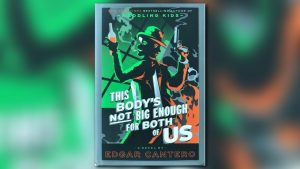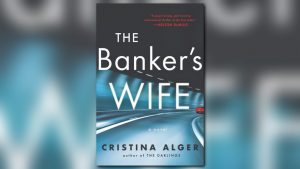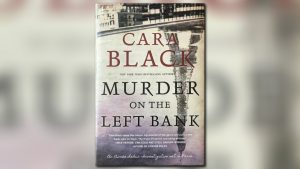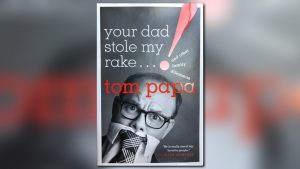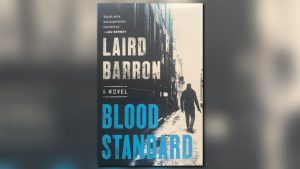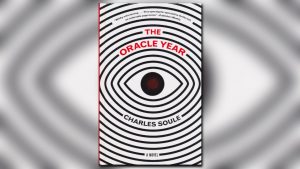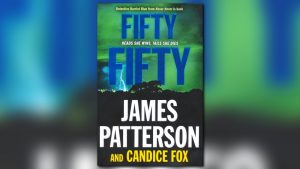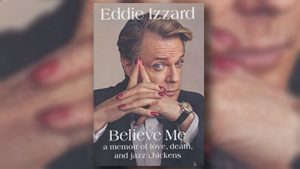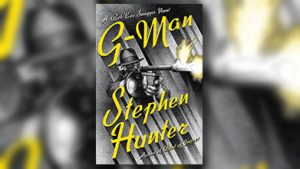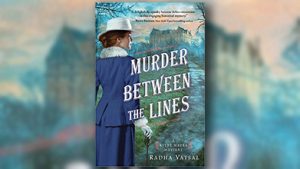The Fall is a thriller following the story of the death of an African American foster child, Tanya Morgan.
The question is, did she fall, or was she pushed? Lawyers Dismas Hardy and his daughter Rebecca are on the case.
A middle school teacher named Greg Treadway is the number one suspect.
However, during Greg’s trial, new suspects and findings come into play in Rebecca and Dismas’ minds.
The Fall is a signature suspense thriller filled with intricate plotting.
VOICEOVER: And now, an Eight original production. Books & Co. is made possible by the Department of English at Arizona State University and by The Friends of Eight, members of Eight, Arizona PBS, who give additional gifts to support original programs. Thank you.
ALBERTO RIOS: Welcome to Books & Co. Bienvenidos, todos. I'm your host, Alberto Ríos and we're joined today by best-selling author John Lescroart.
JOHN LESCROART: Your pronunciation is impeccable.
ALBERTO RIOS: We'll be talking about his latest novel "The Fall." Welcome John.
JOHN LESCROART: It's great to be here.
ALBERTO RIOS: Let's start right off with the pronunciation of your name as a service to our viewers and your reader. Lescroart.
JOHN LESCROART: Lescroart. Here's the thing, it looks like les-cro-art.
ALBERTO RIOS: Yes, it does.
JOHN LESCROART: And I like to think of it as the most difficult name in publishing because if you happen to like one of my books, you'll go you've got to read this by this John guy.
ALBERTO RIOS: Well, it's a lot of fun and I have to say reading through the work is -- it's a thriller so therefore, I guess you could say it's thrilling. And, in fact, it does live up to that. You have a lot going on here and I want to talk about the work in general. You're known for your legal and crime thriller novels, including other characters, not who we're going to talk about today, Wyatt hunt, they make an appearance here. But you call this Rebecca Hardy's first case.
JOHN LESCROART: Yes. Well, Dismas Hardy is my first character I've written seventeen or eighteen of my books about him. But early on, I made the decision to have him grow in real time, age in real time. So we've been following his family, which is his wife, Frannie and his two children Rebecca and Vincent. And Rebecca we meet in book three and she's an infant. And we follow her as she grows up and she is what you might call a high-maintenance child, that I borrowed a lot on my own daughter from and I think it enriched the books greatly. And as she gets older and older, I kept seeing her get out of high school and go to college and it turns out in the last book she was a law student. And, you know, since she's growing in real time what happens next is you become a lawyer. And I didn't plan this book to have her be even in the book.
ALBERTO RIOS: Really?
JOHN LESCROART: Not at all. I had what I thought was a terrific beginning, things just started going along and I was probably four or five chapters in and I was at work, just sitting here staring at the blank screen going wonder what I'm going to write next and, all of a sudden, Rebecca basically shows up and she's got an office down the hall from her dad and she comes in to talk to her dad about some legal stuff and I'm going this is perfect. This is what I need to bring this novel to life and then suddenly there she was and sure enough she took over.
ALBERTO RIOS: Just quickly. We talked about your name. She has an affectionate name.
JOHN LESCROART: She's “The Beck.”
ALBERTO RIOS: The Beck. Tells us a lot right there.
JOHN LESCROART: She is definitely a personality of her own and, you know, that's what you try to do in these books is you have people that can stand up on their own and take charge, and it's one of the ironies about my whole group of books is my agent calls them a fugue of books because they start out with a few people, and then let's see, Wes Farrell shows up in book and then Gina shows up in every book, and then she winds up getting her own book. It's main character crazy. I don't know how it works but it's fun.
ALBERTO RIOS: You maybe could start us off by giving us a synopsis of this particular book now. This is "The Fall" and it refers to something that happens at the beginning of the story.
JOHN LESCROART: Well, you know, so many books, the way they begin at least in my case is I'm trying to think of a good first sentence. You write the one true thing as Hemingway said and I start many of my days trying to write the one true sentence or the very good first sentence, especially when I don't have a book up yet, when I don't even know I'm going to be writing, what exact book I'm going to be writing and in this case I was making up first sentences and I came across the first sentence, the body fell straight out of the sky. And I said no matter what, you're going to want to read the next sentence. And that day I wound up writing three chapters, just boom, boom, and the book started with a fall off a tunnel in San Francisco, which is a real place and it was really fun because it's right up the street from Sam's Grill where I like to go and interview my consultants and my cop friends who tell me stuff. And she does a terrific job of getting involved in this case.
ALERTO RIOS: So that admonition of write what you know is what you're doing?
JOHN LESCROART: San Francisco is such a great place to do it but this particular tunnel is kind of a scary thing. Even when you're just walking over it. You hear the cars going by and I have a true sense of what it's like to walk across that thing in the middle of the night, and it's just one push away from death and there's no rail, it's just -- not even quite waist high and you can just look over and imagine falling. And that's how the book was made.
ALBERTO RIOS: You mentioned who would not want to read the next line? I think that's accurate. I think one of the great things that you do here is the way you compel us as readers with the plotting that you've put into place here and you give us information, we start to count on it and you pull the rug out from under us repeatedly.
JOHN LESCROART: That's the fun of the game.
ALBERTO RIOS: It is the fun of the game, and I think you're on it and I think what's really wonderful is that you do it through the eyes of Rebecca who's not on it. She's surprised.
JOHN LESCROART: She's surprised almost at every turn because she is, after all, way too young to be doing a homicide case really. I mean, she's a year at the most in this firm. And I have a daughter who's the Beck's counterpart and my daughter's a lawyer in San Jose. And there's no chance in the world they would give her something equivalent to a homicide case. But in this case, she meets the defendant or the person who becomes the defendant, he asks her some questions and pretty soon they're legally entangled and how she even maneuvers the early game of how that works to become someone's attorney when you're just meeting his friends, it's pretty fascinating, and it's pretty unknown I think by the general public.
ALBERTO RIOS: And a lot of backgrounder, insider information in that regard which I think is half the fun.
JOHN LESCROART: Oh, yeah.
ALBERTO RIOS: Starting with even how to charge somebody actual money.
JOHN LESCROART: This is one of the things I actually did have a lot of fun with because, you know, the idea that you're going to charge somebody $100 an hour, which is, by the way, way too low if you're on a homicide case.
ALBERTO RIOS: As her father says.
JOHN LESCROART: And her father, every step of the way he's going really, really you want to do this? I really like the dynamic between Dismas and the Beck, right from the beginning; he's really a good dad. And he's a good lawyer. He tells her you're not thinking like a lawyer here. You're thinking like a person.
ALBERTO RIOS: And one of the great parts of his personality is his obsession with minutia so even you said she was working on the homicide and in there his admonition is don't call it a homicide. Call it the event, the accident, the whatever.
JOHN LESCROART: Well, that's where we get into the trial itself and the trial, all the trial minutia as you say, that to me is about the most fun thing you can write because when Hardy tells the Beck - don't call it a homicide. That one example, you follow that -- even as I went back and read it the tenth time, every time she's cross-examining someone, you're waiting for that moment to click in and then it does, and I think it's extremely satisfying to see it kind of jell into its own thing, and it pays off. It pays off.
ALBERTO RIOS: It does. And I think as a reader, you get reminded of -- you know the big things are going to take care of themselves on some level but the small things you get reminded there's a story going on here and everybody's struggling. The lawyers are struggling. The people who are charged with the crime are struggling, people in general are struggling.
JOHN LESCROART: The cops who arrested him are struggling.
ALBERTO RIOS: And that makes it a complex story because there's a lot of moving parts.
JOHN LESCROART: Yeah. A lot of moving parts.
ALBERTO RIOS: And that part is moving, we track it, and it's those little details that help us see our way through it.
JOHN LESCROART: Right.
ALBERTO RIOS: One of the things that starts this, and I think it's very right on point in contemporary America, it's an African-American who gets pushed over or there's an accident.
JOHN LESCROART: Don't say which!
ALBERTO RIOS: And then that puts an undue pressure on everybody and we understand it. We're going through it right now.
JOHN LESCROART: Well, this does so ironic to me because when I wrote this stuff, when I wrote this racial subplot, which is not really a subplot, it's the driving engine of the whole book, I was a little concerned that this was anachronistic already, chronologically out of whack because this isn't really happening in our country too much anymore, and then I finish this book and Ferguson happens and New York happens and Baltimore happens. It's amazing how prognosticatory it ended up being.
ALBERTO RIOS: It helps us understand that complexity. We want to have something done in the public's imagination and yet you've got detectives who know what they're doing, it just may not perceptively seem that way.
JOHN LESCROART: That's the thing that's so amazing about this story I'm telling is we have these detectives who are really doing the right thing and we're watching them do it and they're being very careful, except it can be definitely argued by any good arguer to figure out how to pick that all apart. So these guys are up against it right from the very beginning.
ALBERTO RIOS: What's really hard, too, is it's not necessarily that the public is wrong but in this story, that public perception is the wrong way to put pressure on a group.
JOHN LESCROART: The conflation, if you will, of both the police side and the district attorney side, the fact that the District Attorney has not been able to get a conviction on anybody accused of killing an African-American is not the same thing at all as the police not being able to find a suspect in those cases and yet from the public's point of view they're the same thing. So again, moving parts but I think they're really intricate and fun to work with.
ALBERTO RIOS: They are and they push buttons in us where we want to cheer for one side, and then we get our rug pulled out from under us when we start to see the actual workings of what is entailed in any of it, not just in this investigation but any investigation.
JOHN LESCROART: The great rug puller.
ALBERTO RIOS: Well, you from the beginning, I was saying we get this insider view of the detectives, the defense attorney, and we have some occasion rules of thumb, which I don't know if they're accurate or not but I loved it. I liked the one, I can't say liked it, I just haven't heard it that you would survive a fall less than three times your height.
JOHN LESCROART: Isn't that a great fact?
ALBERTO RIOS: It's a great fact.
JOHN LESCROART: I actually did --
ALBERTO RIOS: Objectively speaking.
JOHN LESCROART: I did the research on it because I was worrying if it was real or possible for someone to survive this fall. It seemed like a short fall so I looked it up. I went on Google and I found several sources that the rule of thumb is if you're falling from three times your height, you're going to die. You don't think of that, it's that close. And then, you know, of course if you're four times your height, you're going to die. But it's fascinating.
ALBERTO RIOS: It is fascinating.
JOHN LESCROART: One of the other things, too, that makes this complex is that the word liar gets a real workout here and we've got a character, he says some things in the beginning to the police which they later find he's perhaps left some things out. He didn't -- he didn't exactly -- this is very interesting to me. But everybody thereafter said he's a liar. Talk about that a little.
ALBERTO RIOS: You know.
JOHN LESCROART: I found that so intriguing.
ALBERTO RIOS: You can lie in many different ways, and, you know, the lie of omission is a pretty big lie and it becomes a big issue in almost any police investigation if a guy doesn't say something that he normally would say something, he's in effect lying. And then you go back --
JOHN LESCROART: That's a big statement.
ALBERTO RIOS: It is a big statement.
JOHN LESCROART: Pretty interesting. Yeah, but it's also one of those things where you can't really prove a negative. So there's deniability all the way along the line and the interesting thing about a lie is that a lie almost always leads to another lie because there's just no way to sustain it. And that's what this, we see in this cascade of lying that begins to develop and yet it's all explainable. There's no real judgment about whether or not it's going to take him guilty or not.
ALBERTO RIOS: That's what's really fun is that you can't argue that something --
JOHN LESCROART: Hey, yeah, I did that but so what? It didn't have anything to do with what we're talking about.
ALBERTO RIOS: I would like to remind our viewers that you're watching Books & Co. I'm your host Alberto Ríos and we're joined today by John Lescroart.
JOHN LESCROART: He's good!
ALBERTO RIOS: Talking about his latest book
"The Fall."
JOHN LESCROART: Good.
ALBERTO RIOS: And use your line about the opposite of Lescroart.
JOHN LESCROART: It's quite clearly more-kwah.
ALBERTO RIOS: We'll talk about more-kwah here, perfect. You take us farther than just the idea of lying and as we are reading this book, we're learning as much as simply being entertained and I always appreciate that as a reader. It's not heavy-handed and I think you handle that very well. One of the intriguing things you talk about is what turns out to be a very important distinction between insanity and incompetence.
JOHN LESCROART: This is something that I just love because when I wrote the first draft I got about halfway through and I said I've got to talk to -- I have a consultant that I use who has been my best friend since I was fourteen, I'm lucky to have him in my life and he's been my consultant on these books forever because I'm not a lawyer and I never went to law school and I frequently get things completely wrong and one of the things I got wrong was this distinction between insanity and incompetence and incompetence is far more interesting, I think.
ALBERTO RIOS: I agree.
JOHN LESCROART: And then the other thing, I don't think this is giving the world away in this book, it's not a spoiler, but what goes on with how they keep people who are incompetent in custody is just a fascinating little detail of how American law works but I called my buddy Al and said am I getting this, right? He said actually you are getting it right. And the only thing I got wrong was what they called it. It's always called by the penal code number.
ALBERTO RIOS: The number, that leads us to something else in here is in those levels of incompetence or, however, that's being adjudicated, there's an awful lot of paperwork which becomes another factor in the story.
JOHN LESCROART: Well, I mean what you have to do in these books is you want to -- because really people hear about legal thrillers and quite often people go that's almost an oxymoron. It's like military intelligence. It's really not something we think about. And it's fun to make this paperwork part of the tension of the trial. Because whatever else is happening, you've got to keep up with all the paperwork, all the filing of the motions, you have to do all that stuff in time in real time and everything it does takes away from your time which you don't have any of. One of the things that I think makes a legal thriller thrilling and makes it work is when you get the levels of suspense from so many point of view, at some point you're like at a tipping point and you just can't stand it anymore. And that's what I try to do with these books is get to where the pressure that the person that we're rooting for feels comes at her in this case from every possible angle, from her client to her father to her roommate to her mother, you know, to her friends, it's just like the whole world coming apart. And she's got to save it. And it's a fascinating chess game but I love it.
ALBERTO RIOS: Let me ask you this about your writing, what would you even call it? Your writing imagination.
JOHN LESCROART: Okay.
ALBERTO RIOS: Do you plot things out ahead of time? Did you know how this was going to end up?
JOHN LESCROART: No.
ALBERTO RIOS: Or do you write to the surprise?
JOHN LESCROART: No, no. I don't outline. And, in fact, in my acknowledgments I single out a woman named Cora Striker and she's a woman I knew through U.C. Davis, where I live, and I was at a party with her and talking about this book, about a year ago. And I said I am just dead in the water here. I don't know who did it, I don't know how to prove it, I don't know how to prove he didn't do it, you know, and I don't have a motive. And she gave me a motive.
ALBERTO RIOS: That's great.
JOHN LESCROART: Like that. And I went home the next day and that was it. I just wrote the rest of the book. The next two months were just heaven. Just coasting in.
ALBERTO RIOS: It's a wonderful -- it's hard to know how to invite students which way to go.
JOHN LESCROART: And especially I don't think you can tell people how to write. I know that goes against the grain about writing instructors and everything but writing is very much a voice, and it's kind of like if Pavarotti sings the phone book it's going to sound good and you have to get your voice in order and a lot of people don't spend enough time early in their careers trying to get the voice, the narrative voice they want to put into the book and I spent a lot of time on that when I was writing my early bad books.
ALBERTO RIOS: That's how it works. You get better; it's the hard work of good work.
JOHN LESCROART: Exactly.
ALBERTO RIOS: I think that's also something that we as a culture now we seem to be in such a hurry, we forget we've got to spend some time actually sitting at the --
JOHN LESCROART: The craft.
ALBERTO RIOS: The craft to use the word.
JOHN LESCROART: But there is a little craft involved.
ALBERTO RIOS: How much time writing would you say you spend a week?
JOHN LESCROART: I don't measure it that way but I go in every day around ten thirty and I'm at my desk until five pm and I treat it like a job. I go in every day certainly, I usually don't go in on weekends. I don't do nights and I don't do windows. Unless they're part of the plot, then I'll go there. I treat it very much like a job.
ALBERTO RIOS: Getting back to the story for a moment, we were talking about the administrative paperwork and how that all sort of plays in, and a legal thriller has that underscore of flatness right, which anybody who works in any kind of a job certainly is going to recognize. But that also means paying attention to language. And so you're also admonishing us as readers, pay attention. And there are occasional moments where you have some fun with that, where you talk about, for example, the board of stupid-visors, for example, and then my favorite was a woman responding that homicide protocol was for completely dead people, not almost-ees. That made me laugh.
JOHN LESCROART: I think it's very important to laugh. I really think, especially dealing with very serious topics like I do in this book, if you don't have a little bit of levity you're in trouble. I think the funniest scene I've ever written in my life is in this book and it doesn't give too much away but you'll remember it, there's the opposing attorney coming into court on day two and he's limping.
ALBERTO RIOS: Yes, yes.
JOHN LESCROART: We don't have to say why now on the show but I just thought literally I was sitting at my desk crying. I was laughing so hard I'm going this is a very funny thing to have happened.
ALBERTO RIOS: It is funny and it played into the frustrations of what doing that job must actually feel like.
JOHN LESCROART: And sometimes, this is going to happen. You're going to come in the next day limping. Well, the other thing, just a little drama, courtroom drama is probably a better way to describe those than legal thrillers, but the drama of the courtroom is so intense like the first time Dismas Hardy is there and the opposing attorney comes up to him just to say, “Hi, I'm a fan.” And Hardy's sitting there going. “does he mean that or just playing with my head or what is happening?” It's so much antagonism and so much -- fraught with tension underneath that the most innocent little thing becomes this big thing. And I think it just makes it all the better.
ALBERTO RIOS: I also like that he can't just simply take a compliment without thinking well what's behind that?
JOHN LESCROART: You can't mean that, it's got to be wrong.
ALBERTO RIOS: Reading through this also you make some curious mentions of different things and it was nice and I just liked hearing mention of Teach for America, for example, and I'm glad you did that. You also have -- you're part of -- it's a process, I've seen it before where people, if they support or agree to support a cause, they can name a character.
JOHN LESCROART: Oh, this has been a fabulous -- this is truly a fabulous thing. I've done this in my last eight or nine books and, you know, in the old days they used to ask authors to donate a book and sign a book for a charity. And so you would give it to them, the charity it would raise $30. And then maybe ten years ago somebody got the brilliant idea would you name a character in your book for me? Or whoever's the big bidder? Well, first time I did this, this is just a staggering story was for the Sonoma County Hospitals. And they invited me up because they wanted me to have a character in my next book be whoever bid the most. The night I went up to the auction, a guy named Fred Firth paid $34,000 to have his name in “The Hunt Club” I think. It was “The Suspects,” I don't want to get it wrong. It was “The suspects.” But since that time, I've done about three per book, and nowhere near usually that price but they start at a very, very high level, and it's very -- it's really good for the charities.
ALBERTO RIOS: It's a humanizing approach to the harder act of simply writing and being separate from everybody as you do that.
JOHN LESCROART: The other thing is, you know, people don't even sometimes understand this but you think when you're writing a book and you name a character that that's an inviolable decision but it's funny over the years now, I have changed the names of characters at the galley stage because somebody just paid $3,000 to have their name in the book so it works very well.
ALBERTO RIOS: It's hard sometimes, I don't know what readers' perceptions are about I choose every last single word.
JOHN LESCROART: You like to think that.
ALBERTO RIOS: You do like to think that but there's more to it.
JOHN LESCROART: When you have a bigger, you know, context, you can change to fit that context. So that's one of the things. I'm really proud of the fact that I do this.
ALBERTO RIOS: One of the things as we close that I like to look for is a thesis moment and for me, it goes back to the lying, and it's a very simple line. “But what does matter is lying,” Hardy said, “now, they think he's a liar and therefore, no matter what he says it's suspect.”
JOHN LESCROART: That's right.
ALBERTO RIOS: That was a great moment.
JOHN LESCROART: Thank you.
ALBERTO RIOS: Thank you for joining us here today.
JOHN LESCROART: Great pleasure.
ALBERTO RIOS: And I would like to thank our viewers for joining us, as well. You've been watching "Books & Co." My name is Alberto Ríos and we've been joined today by John Lescroart talking about his latest book, "The Fall." Please join us again next time when we'll be bringing you another good book. John, thank you.
JOHN LESCROART: Thank you.
VOICEOVER: "Books & Co." is made possible by the Department of English at Arizona State University and by the Friends of Eight, members of Eight, Arizona PBS, who give additional gifts to support original programs. Thank you.





